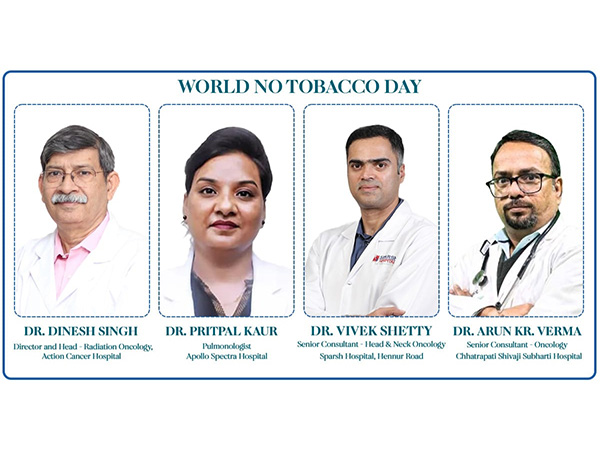World No Tobacco Day 2025: Experts Unite Against Tobacco as a Leading Cause of Cancer and Chronic Diseases
May 31, 2025

PNN
New Delhi [India], May 31: On the occasion of World No Tobacco Day, observed every year on May 31, leading healthcare experts across the country are sounding a clarion call against one of the biggest threats to global health: tobacco. Beyond awareness, experts are demanding urgent action, highlighting tobacco's devastating and far-reaching effects -- from cancer, respiratory, and cardiovascular disease to infertility and second-hand smoke exposure.
India currently faces over 37.5 lakh active cancer cases, and tobacco remains the single largest preventable cause. According to a global study published in The Lancet's eClinical Medicine, tobacco-related illnesses cause over 1.3 million cancer-related deaths annually across seven countries, including India.
"Smoking is one of the worst carcinogens in the world. Tobacco exposes the entire body, not just the lungs, to cancer-causing agents. It's linked to multiple cancers, including those of the lung, mouth, throat, esophagus, larynx, pancreas, bladder, kidney, stomach, cervix, colon, and even blood cancers like acute myeloid leukemia (AML)," said Dr. Dinesh Singh, Director and Head, Radiation Oncology, Action Cancer Hospital, Delhi.
Dr. Singh further warns about second-hand smoke, stating that even non-smokers exposed to it absorb carcinogens and face a significantly elevated cancer risk, especially for lung cancer.
"Tobacco smoke promotes chronic inflammation, triggering genetic instability and abnormal cell growth -- a key environment for cancer to develop. Nearly every organ in the body is affected," he explained.
Dr. Pritpal Kaur, Pulmonologist, Apollo Spectra Hospital, Karol Bagh, Delhi said, "Tobacco is a toxic cocktail that attacks the respiratory system at every level--from inflaming the airways to permanently damaging lung tissues. COPD, asthma, lung cancer, and bronchitis are just the tip of the iceberg. Tobacco doesn't just suffocate the lungs--it wreaks havoc across the entire body. Every puff poisons not just the smoker, but everyone around them."
As India continues to battle its cancer burden, Bengaluru-based SPARSH Group of Hospitals has taken a bold step forward. On May 18, 2025, SPARSH launched its flagship 300-bed multi-speciality hospital on Hennur Road, Bengaluru, introducing its first comprehensive cancer care facility. Backed by world-class infrastructure and an expert team across 50 specialities, the hospital features 75 ICU beds and an integrated oncology program.
Dr. Vivek Shetty, Senior Consultant- Head & Neck Oncology, SPARSH Hospital, Hennur Road, Bengaluru said, "Along with lung cancer, oral cancer is also alarmingly common among people who smoke or use tobacco in other forms. There is an urgent need to increase awareness about early detection through proper screening and to encourage timely treatment."
"With our new facility at Hennur Road, we now offer best-in-class comprehensive cancer care to combat these life-threatening diseases. Our mission is to bring comprehensive cancer treatment to the doorsteps of people in Karnataka, especially Bengaluru and its neighbouring regions," added Dr. Shetty.
The hospital's approach marries precision medicine, compassion, and accessibility, making it a timely answer to Karnataka's growing cancer crisis, where 86,563 new cases are projected annually, with lung and mouth cancers comprising nearly 16% of male cancers.
Whether smoked or chewed, tobacco remains the most potent and preventable health hazard. And the consequences go beyond cancer, heart disease, stroke, reproductive disorders, and chronic lung diseases, all bear its imprint.
"Tobacco addiction is difficult but not impossible to beat. With modern therapies, counselling, and the right intent, recovery is possible. Every cigarette not smoked is a step toward healing -- not just for the smoker, but for their entire family, said Dr. Arun Kumar Verma, Senior Consultant- Oncology, Chhatrapati Shivaji Subharti Hospital, Meerut.
"From lung, oral, and throat cancers to bladder and oesophageal malignancies, tobacco is a common denominator. What's worrying is that even people exposed to secondhand smoke--like family members or co-workers-are--are at risk," warned Dr. Verma, adding,
"We must dispel the myth of 'safe usage'. There is no safe level of tobacco exposure."
Experts concluded that with early detection, structured cessation programs, and accessible treatment, outcomes can dramatically improve. But quitting tobacco should also be a top priority.
(ADVERTORIAL DISCLAIMER: The above press release has been provided by PNN. ANI will not be responsible in any way for the content of the same)









